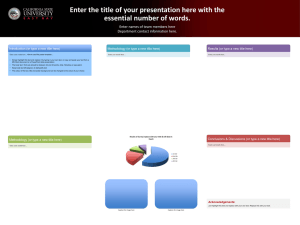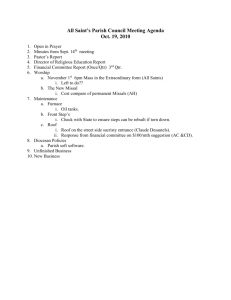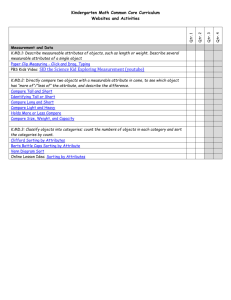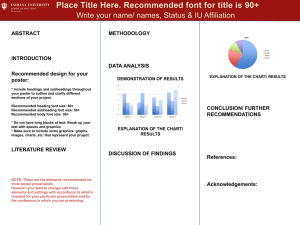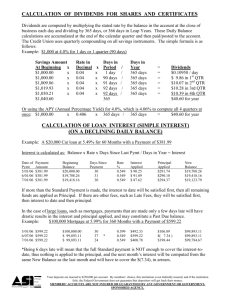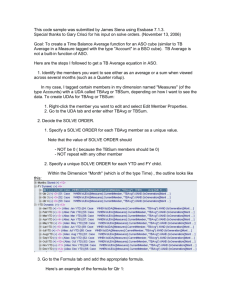Purpose of A Business Plan
advertisement
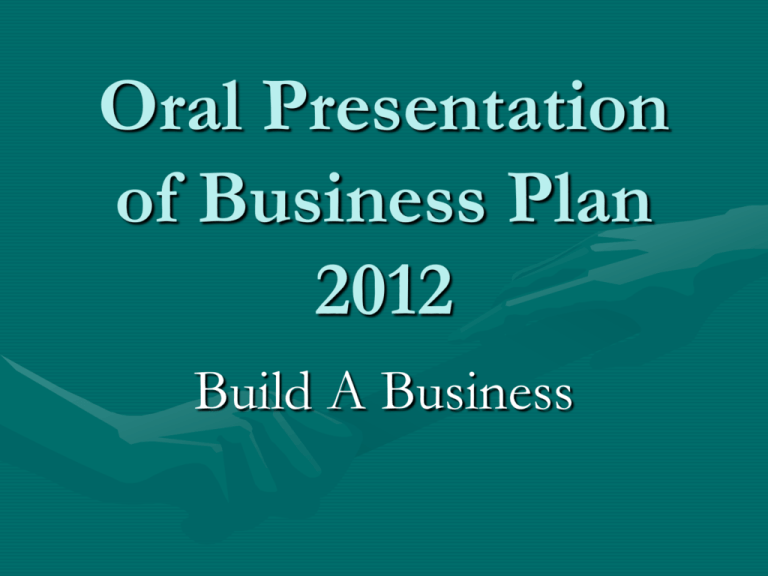
Oral Presentation of Business Plan 2012 Build A Business Purpose of A Business Plan • Explains the idea behind your business and spells out how your product or services will be produced. • Sets specific objectives and describes how your business expects to achieve it. • Describes the backgrounds & experience of the people who will be running it. Importance of a Business Plan • Makes you think about all aspects of your business • May help you secure financing for your business. • Helps you communicate your ideas to others. • Can serve as a tool for managing your business. Elements of Oral Business Plan Presentation 1. 2. 3. 4. 5. 6. 7. 8. 9. Introductory Components Marketing Plan: Assessment of the Environment Marketing Plan: Marketing Mix & Break Even Analysis Management Functions Financial Data SWOT Analysis Quality of Slideshow Quality of Oral Delivery Question and Answers Introductory Components 5% • Relevant Introductory Information – Name of business, logo, data & other pertinent information • Executive Summary – Summarizes entire plan & includes important details such as: Concept & Opportunity, Product/Service, Market, Management & Financial Requirement. Introductory Components • Company Description - Describes in general terms a clear and concise picture of what the company does, original date, industry sector, location, legal description, brief history (if existing company). • Mission Statement - Brief statement that will set the tone, provides direction for the company. Market Plan 25% Assessment of the Environment (10%) • Current Economic Conditions- Snapshot of the environment • Industry Analysis – Both the real-world & virtual industries. Provide competitive national or local business trends • Target Market - Geographic, Demographic & Psychographic. • Market Segmentation - Age, Income, Product Type, Geography, Buying patterns & Customer Needs Marketing Plan (cont.) The Marketing Mix & Breakeven Analysis (15%) The Marketing Mix: • Product - Key Products & Features • Price – Pricing Objectives (Maximize Profits? Maximize Sales?), How Prices Determined (DemandBased? Cost-Based?) • Placement – % of Sales from Trade Shows? % WebBased Sales, % from Non-Virtual Customers • Promotion – How do Customers Know about Business? Doing Business with You? • Positioning – Image Created in Customer’s Mind Marketing Plan (cont.) Break-Even Analysis: • Provide amounts in total dollars or number of sales. • Provide details about assumptions used to perform analysis. • Provide Profit Margin Percentage assuming all costs are fixed except for Cost of Goods Sold). Management Functions 10% • Planning –What are the goals of business? What are the strategies to achieve each goal? • Organizing – How is the firm organize to meet the objectives? • Directing – How are directions, assignments, instructions & information provided? • Controlling - How does the firm monitor progress towards the goals? Financial Data 10% • Start-up Cost (only if new business) • Balance Sheet • Income Statement (1 yr) • Cash Budget Statement (1yr) • Financial Write-up • Compare projected & actual financial statements 90 80 70 60 50 East West North 40 30 20 10 0 1st 2nd 3rd 4th Qtr Qtr Qtr Qtr SWOT Analysis & Discussion of Business Risks 5% SWOT Analysis (2.5%) • Internal Audit – Strengths & Weaknesses • External Audit – Opportunities & Threats Discussion of Business Risks (2.5%) • Business Risks – Identified & Addressed • Strategy for dealing with Risks Quality of Slideshow 10% • • • • • • • Logical Organization Well Designed Understandable Content Creativity Professional Layout Appropriate Use of Graphs, Charts, & Photos Writing Skills Free of Errors Quality of Oral Delivery 10% • • • • • • • • Persuasive, Engaging, Articulate Correct Grammar, Avoid Use of Slang & Fillers Appropriate Voice Projection Personable, Connects with Audience Professional Attire and Demeanor Appropriate Body Language Syncopation of Slides and Speaker No Frivolous Content or Redundant Questions and Answers 25% • Accuracy - Relevant, Truthful and Accurate • Quality - Response Appropriate, Answers Question • Poise - Comfortable, Confident, Responds Well • Team Coordination - Responses Not Dominated By a Single Team Member, Majority of Team Members Participate Time Penalty 10 Second Grace Period before 1st Penalty • Up to 30 seconds over: 1 point • 31 to 60 seconds over: 2 points • 61 seconds up to 2 minutes over: 5 points • More than 2 minutes over: 10 points
